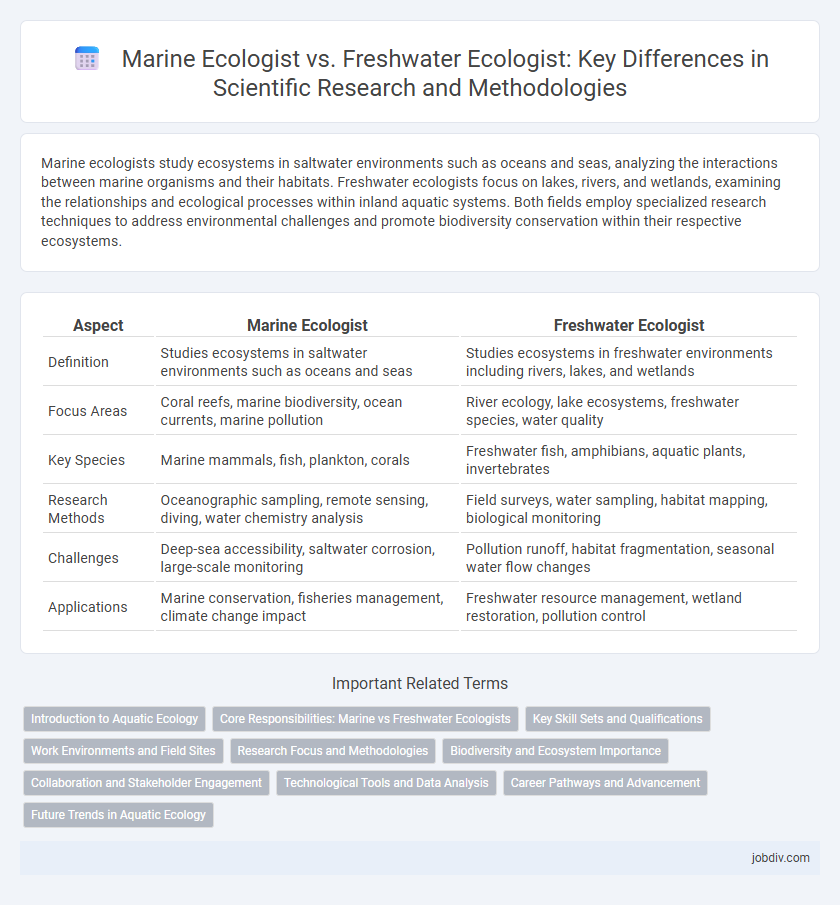Marine ecologists study ecosystems in saltwater environments such as oceans and seas, analyzing the interactions between marine organisms and their habitats. Freshwater ecologists focus on lakes, rivers, and wetlands, examining the relationships and ecological processes within inland aquatic systems. Both fields employ specialized research techniques to address environmental challenges and promote biodiversity conservation within their respective ecosystems.
Table of Comparison
| Aspect | Marine Ecologist | Freshwater Ecologist |
|---|---|---|
| Definition | Studies ecosystems in saltwater environments such as oceans and seas | Studies ecosystems in freshwater environments including rivers, lakes, and wetlands |
| Focus Areas | Coral reefs, marine biodiversity, ocean currents, marine pollution | River ecology, lake ecosystems, freshwater species, water quality |
| Key Species | Marine mammals, fish, plankton, corals | Freshwater fish, amphibians, aquatic plants, invertebrates |
| Research Methods | Oceanographic sampling, remote sensing, diving, water chemistry analysis | Field surveys, water sampling, habitat mapping, biological monitoring |
| Challenges | Deep-sea accessibility, saltwater corrosion, large-scale monitoring | Pollution runoff, habitat fragmentation, seasonal water flow changes |
| Applications | Marine conservation, fisheries management, climate change impact | Freshwater resource management, wetland restoration, pollution control |
Introduction to Aquatic Ecology
Marine ecologists study diverse oceanic ecosystems, analyzing saltwater habitats such as coral reefs and estuaries, while freshwater ecologists focus on inland water bodies including rivers, lakes, and wetlands. Both disciplines examine ecological processes, species interactions, and environmental impacts to understand aquatic biodiversity and ecosystem dynamics. Insights from aquatic ecology inform conservation efforts, resource management, and the mitigation of human-induced environmental changes in marine and freshwater systems.
Core Responsibilities: Marine vs Freshwater Ecologists
Marine ecologists specialize in studying oceanic ecosystems, analyzing marine biodiversity, and assessing the impact of human activities on coral reefs, fish populations, and coastal habitats. Freshwater ecologists focus on rivers, lakes, and wetlands, examining freshwater species, water quality, and the ecological processes that support aquatic life in inland water bodies. Both roles involve ecosystem monitoring, species conservation strategies, and environmental impact assessments tailored to their respective marine or freshwater environments.
Key Skill Sets and Qualifications
Marine ecologists possess specialized knowledge in saltwater ecosystems, oceanography, and marine species behavior, often requiring expertise in scuba diving and remote sensing technologies. Freshwater ecologists focus on inland aquatic systems such as rivers, lakes, and wetlands, emphasizing skills in water quality analysis, hydrology, and species identification unique to freshwater habitats. Both require strong backgrounds in ecology, biology, and environmental science, with marine ecologists typically needing training in oceanographic instruments and freshwater ecologists emphasizing watershed management and pollution assessment techniques.
Work Environments and Field Sites
Marine ecologists conduct research primarily in saltwater environments such as oceans, coral reefs, and coastal estuaries, often working on research vessels or underwater using scuba gear. Freshwater ecologists focus on inland aquatic systems including rivers, lakes, and wetlands, frequently performing field studies in varied terrestrial locations like riverbanks or reservoirs. Both types of ecologists analyze physical, chemical, and biological interactions in their specific habitats to understand ecosystem dynamics and biodiversity conservation.
Research Focus and Methodologies
Marine ecologists specialize in studying oceanic ecosystems, focusing on coral reefs, estuaries, and deep-sea habitats using methodologies such as scuba diving surveys, remote sensing, and oceanographic sampling. Freshwater ecologists concentrate on inland aquatic systems like rivers, lakes, and wetlands, employing techniques including water quality analysis, biological assessments, and hydrological modeling to understand ecosystem dynamics. Both disciplines utilize statistical modeling and field experiments to investigate species interactions and environmental impacts within their respective aquatic environments.
Biodiversity and Ecosystem Importance
Marine ecologists study biodiversity in saltwater environments such as oceans and coral reefs, emphasizing the complex interactions among marine species and their habitats. Freshwater ecologists focus on rivers, lakes, and wetlands, analyzing species diversity and ecosystem functions critical for water quality and nutrient cycling. Both fields highlight biodiversity's role in maintaining ecosystem resilience and supporting vital ecosystem services essential for global environmental health.
Collaboration and Stakeholder Engagement
Marine ecologists and freshwater ecologists often collaborate on interdisciplinary research projects addressing aquatic ecosystem health, sharing data and methodologies to improve conservation strategies. Both engage stakeholders such as government agencies, local communities, and environmental NGOs to implement effective policies and restoration initiatives. Collaborative efforts increase the impact of ecological studies by integrating diverse expertise and promoting sustainable management of interconnected marine and freshwater resources.
Technological Tools and Data Analysis
Marine ecologists utilize remote sensing technologies, autonomous underwater vehicles (AUVs), and satellite telemetry to monitor oceanic ecosystems, enabling large-scale data collection across diverse marine habitats. Freshwater ecologists often employ in-situ sensors, hydroacoustic devices, and GIS mapping tailored to riverine and lacustrine environments for precise water quality assessments and habitat mapping. Both specialties leverage advanced statistical software and machine learning algorithms to analyze complex ecological data, optimizing ecosystem modeling and predictive analytics in their respective aquatic systems.
Career Pathways and Advancement
Marine Ecologists often pursue career pathways centered on oceanographic research, marine conservation, and coastal ecosystem management, with advancement opportunities in governmental agencies, environmental consulting firms, and academic institutions. Freshwater Ecologists typically focus on riverine, lake, and wetland ecosystems, advancing through roles in water resource management, environmental impact assessment, and freshwater biodiversity research. Both specializations require strong skills in ecological data analysis, GIS mapping, and fieldwork, with career progression often involving doctoral research, publication of scientific studies, and leadership in interdisciplinary environmental projects.
Future Trends in Aquatic Ecology
Marine ecologists will increasingly utilize advanced remote sensing technology and autonomous underwater vehicles to monitor oceanic ecosystems, enhancing real-time data collection on coral bleaching and fish migration patterns. Freshwater ecologists are expected to adopt genomic tools and AI-driven modeling to predict the impact of climate change on freshwater biodiversity and invasive species dynamics. Both fields will converge on interdisciplinary approaches combining hydrodynamics, biogeochemistry, and social-ecological systems to address global aquatic ecosystem conservation challenges.
Marine Ecologist vs Freshwater Ecologist Infographic

 jobdiv.com
jobdiv.com